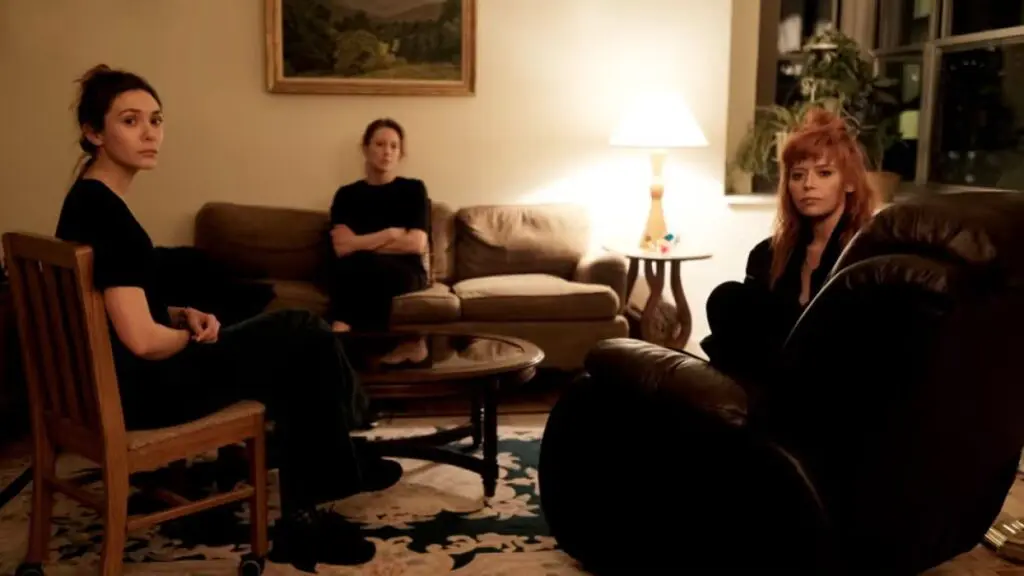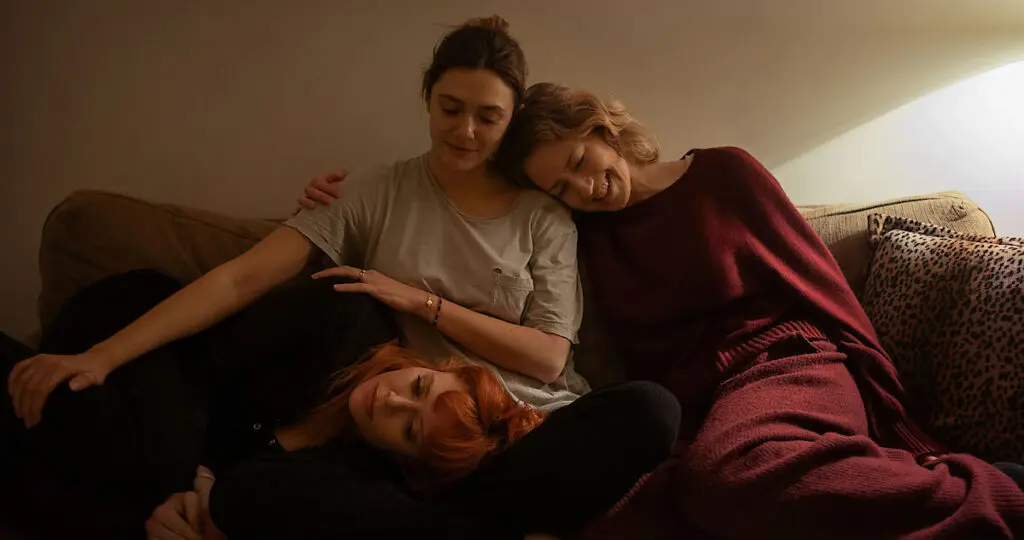Summary
His Three Daughters is a deeply heartfelt and remarkably powerful chamber piece bolstered by three expert performances.
His Three Daughters is a remarkable film that, at its best, is a reminder of what film can be, what it can mean and to whom, without a few hundred million dollars’ worth of CGI and effects to paper over the cracks. Writer-director Azazel Jacobs needs only a tiny handful actors and a single Manhattan apartment. His movie, now streaming on Netflix, unpicks a knot of grief so tightly wound that its eventual unfurling is as much a relief for the audience as the three estranged sisters whose father is steadily but inexorably dying.
“Sisters” implies warmth, connection, and solidarity that the film’s opening, a conversation between three woman framed as three contrasting individual monologues, tells us isn’t shared between Katie (Carrie Coon), Christina (Elisabeth Olsen), and Rachel (Natasha Lyonne). All three sisters have come together to shepherd their ailing father, Vincent (Jay O. Sanders), to the other side, helped along by two palliative care nurses, including the ironically-named Angel (Rudy Galvan).
There are no other characters besides a local cop named Victor (Jose Febus) and Rachel’s boyfriend Benjy (Jovan Adepo), though neither appear often or for long. Even Vincent remains hidden from view, his life a steady beep-beep-beep of the machines he’s hooked up to, until an improbable late sequence that beautifully ties everything together.
The time until then is spent exclusively with the sisters, who are all so wildly different as to seem like transplants from other movies. Katie is the oldest, a take-charge, judgemental control freak who treats the organization of Vincent’s DNR as though it’ll somehow make up for not visiting him enough in his later years, or prevent her from spoiling the teenage daughter who’s now rebelling out of her control.
Christina, meanwhile, is a new mother who has travelled from an unspecified location on the other side of the country, leaving behind her daughter for the first time. She lives behind a façade of perfection that she keeps in place with idle ceremonies like meditation and yoga, but she’s fraying at the edges quite visibly.
It’s Rachel, though, a sports-betting pothead who has lived with her father throughout his illness, caring for him in the absence of her sisters, who is undeniably the focal character. She isn’t Vincent’s biological daughter but came into the family through his second marriage, and has never quite got past a feeling of alienation that seems especially haunting in the context of her father’s coming absence. Without him to unify the family, who will she be and where will she go?
These questions and more are answered throughout His Three Daughters, mostly in the form of assumptions and passing remarks that metastasize into full-blown outbursts and clashes. Katie’s judgement is often the catalyst; it’s her who mentions that there are only old apples in the fridge, that Rachel’s name is the only one on the lease, and often refers to Vincent as “her” father instead of “theirs”.

His Three Daughters | Image via Netflix
But it’s not as simple as that. The sisters have grown up largely apart, separated by age and often location, and their personalities are so distinct that they scarcely understand themselves, let alone each other. Katie’s fixation on the mundanities of palliative care – chasing up the DNR, writing the eulogy, fretting about what happens to the apartment after Vincent passes – are futile attempts to control a situation that cannot be controlled.
Likewise, Christina’s fondness for routine and wellness activities like yoga is a smokescreen for homesickness, and an anxiety that comes from performing a life instead of living one. Christina would like to be a woman who meditates but knows, deep down, that she isn’t. Without her father, and her sisters, who will she become?
Coon, Olsen, and Lyonne are all wonderful in His Three Daughters. Coon’s simmering resentment comes to a boil as she starts to drink more and more, but cracks that form let new emotion through. Olsen, too, does a remarkable job of allowing her girl-next-door disposition to give way as her peace-making efforts make things worse, not better.
But it is Lyonne, again, who stands out, stealing every scene with an easy-going and tremendously likeable charm and vulnerability. She is, regrettably, the only character you can bring yourself to actively root for.
But who you like or dislike isn’t the point. This isn’t a film that is willing to take the easy option of making all three sisters infallible; they’re all deeply flawed, and their relationships wildly dysfunctional. The complexity of their dynamic clashes harshly with the bureaucratic manner of end-of-life care, where the gradual expiration of a loved one is reduced to a checklist of unavoidable milestones, each day another step closer to the end.
His Three Daughters isn’t about death, though it lurks in the room next door throughout the entire runtime. Instead it’s about learning to live, with each other and with yourself and your foibles, and doing so before it’s too late. Wrenchingly emotional without being soppy and manipulative, and darkly funny without being silly, it’s a masterclass in acting and screenwriting and without a doubt one of Netflix’s best movies of 2024.




